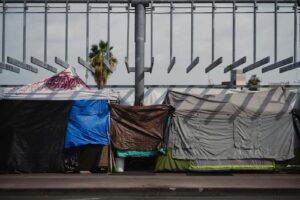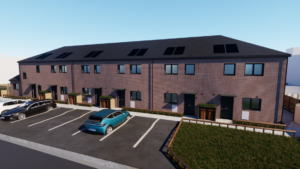Wealthy second home owners are exploiting a loophole to avoid paying council tax
In rural areas, wealthy second homeowners are avoiding making any contribution to local coffers by registering their properties as businesses eligible for rate relief.
Freelance journalist Darren Devine looks at the measures being used to thwart second home ownership in rural beauty spots, where local families can find themselves unable to compete with affluent outsiders.

Mevagissey Harbour – Photo Credit – Colin Park
In picture-postcard Mevagissey on Cornwall’s south coast, the average price of a house starts at around £248,000.
But mid-level earnings in Cornwall last year were £23,000 — less than a tenth of the price of one of Mevagissey’s sought after properties.
James Mustoe, 34, has felt the impact of second homes both personally and professionally. As the area’s councillor, he has seen how a relentless onslaught of outside wealth massively inflates the housing market and leaves locals behind.
And with civil servant wife Laura, 39, he is still saving so they can buy their first home in the community where he grew up.
Last year Mevagissey decided enough was enough and held a local referendum on whether outsiders should be prevented from buying new-build properties to use as holiday homes.
The policy was supported by 90% of voters, with only 60 people wanting to block the move.
Mustoe said: ‘When myself and my partner, my now wife, got together back in the early 2000s we couldn’t afford to rent or buy a property in the area that we’re both from — Mevagissey.
‘So we had to make alternative arrangements elsewhere.’
Mustoe says he went into politics so locals would ‘be able to live, work and grow up’ in rural areas struggling with high property prices linked to second home ownership.
In 2016 St Ives became the first Cornwall town to hold a referendum on stopping sales of new homes to outsiders planning to use them as holiday properties, with 80% backing the plan.
Other referenda in Cornwall followed, with St Minver and the Rame Peninsula also turning to their voters to put the brakes on holiday home ownership.
And Northumberland followed suit in May of 2018 when 90% of locals voted for a ‘neighbourhood plan’ to protect the villages of Bamburgh, Beadnell and Seahouses.
Reports suggest census data showed that 55.3% of homes in Beadnell were not permanently occupied, along with 47.1% in Bamburgh and 29% in North Sunderland parish (incorporating Seahouses).
And though St Ives captured most of the headlines it wasn’t the first to resort to a referendum to deflate its overheated property prices. Lynton and Lynmouth, in Devon, used the tactic as early as 2013.
Policy adviser with the Campaign to Protect Rural England (CPRE) Lois Lane said it’s not clear that the referenda attempting to stifle second home ownership have brought down prices for locals.
There is nothing in the referenda results to prevent would-be holiday home owners simply focusing their efforts on older properties instead of new builds in places like Mevagissey and Beadnell.
Lane said: ‘We’ve found that although it’s a real problem in some places it’s part of a much wider issue, which is the problem of the undersupply of affordable and social housing.’
Loopholes

Barmouth, Gwynedd. Photo Credit – Pixabay
Research by the Lake District National Park Authority found that having 20% of properties in second home ownership is the maximum sustainable level.
But some Lake District villages have figures of 50% or more.
In North Wales, Gwynedd Council, has not resorted to a referendum but instead tried to control second home ownership through council tax.
The north-west Wales county, which is home to much of the Snowdonia National Park, has put a 50% premium on its council tax for second homeowners.
Official figures released in 2017 showed Gwynedd had 5,626 second homes, more than any of Wales’ other 21 local council areas and twice that of Pembrokeshire, which had the second highest level at 2,801.
The council tax premium was designed to ensure anyone fortunate enough to own a Gwynedd holiday home makes an important contribution to local coffers when austerity is still taking its toll.
However, lead revenues advisor for the Chartered Institute of Public Finance and Accountancy (CIPFA) Adrian Blaylock is unconvinced that Gwynedd’s approach could work elsewhere.
‘From CIPFA’s perspective if you can afford to buy a home on the North Yorkshire Moors is that (a 50% council tax premium) really going to dissuade you from doing it? It’s really hard to say,’ he said.
Also, there are clear signs that charging a premium can backfire and instead of councils collecting half as much again from their affluent part-time residents they sometimes end up with nothing.
There have been calls from across the political spectrum for action over a loophole that allows second home owners to avoid all council tax by registering their properties as a business.
Earlier this year it emerged almost 800 second home owners in Gwynedd were paying no council tax after managing to take advantage of the loophole.
Holiday homeowners do not pay council tax if they can show their property is available for rent for 140 days each year.
And with many also eligible for small business rate relief the upshot is that some are able to avoid all local taxes.
Gwynedd officials have suggested that while the council tax premium was generating more cash than anticipated, local coffers would have had an even greater boost if holiday homeowners were unable to switch to business rates.
Little or no realistic effort
In a statement, a Treasury spokesperson told NewStart they were ‘aware’ aware of concerns that some property owners may be making ‘little or no realistic effort’ to let properties out whilst claiming small business rate relief.
‘Which is why we’ve also consulted on strengthening the criteria for holiday lets to be liable for business rates,’ they added.
But by the end of another summer, landlord’s bank balances in Gwynedd and Mevagissey will swell while the rural housing crisis deepens.
















